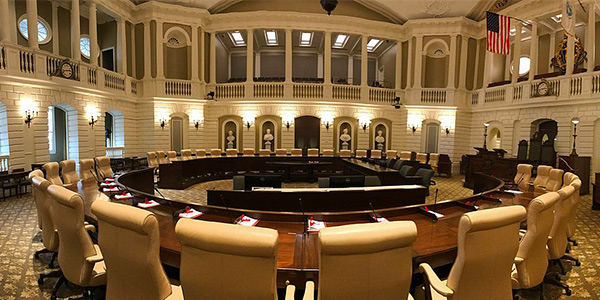Massachusetts Senate Minority Leader Bruce Tarr (R) on Thursday delayed the vote on an exhaustive climate bill after lawmakers reworked the text to incorporate amendments from Republican Gov. Charlie Baker.
Tarr called for more time for legislators and the public to review the new version of the bill after the changes were released late Wednesday.
Senate Democrats expressed their disappointment that the vote was delayed. The bill has been more than a year and a half in the making in the legislature and would serve as one of the leading mandates for reducing carbon emissions in the U.S.
“Human beings are already too late in responding to human-made problems caused and represented by climate change,” Sen. Michael Barrett (D), lead on the climate bill, said on the Senate floor.
The version of the bill up for a vote maintains several of Baker’s provisions in the amendments he sent back to the legislature in early February, including a specialized energy code that will enforce net-zero building construction for towns that want it. The bill also sets mandatory emissions limits in the transportation, manufacturing and natural gas sectors. (See Baker Returns Climate Bill to Mass. Legislature.)
The latest delay of a comprehensive climate bill for Massachusetts took place Thursday in the Senate, seen here, where Republican lawmakers held up a planned vote. | Montanabw, CC BY-SA 4.0, via Wikimedia Commons
Baker attempted to loosen legal requirements for specific business sectors to meet emissions reduction goals, suggesting the requirements serve as “planning tools” or guidelines for industries, a move supported by the influential employer group Associated Industries of Massachusetts.
The governor also faced pushback from the real estate industry, which called on him to oppose provisions that would allow towns to adopt rules requiring that new buildings meet net-zero emissions. Developers expressed their concerns to Baker about the increase in upfront costs for construction.
“There is always an interest group working through their elected representatives to keep things moving at a painfully slow crawl,” Barrett said on the Senate floor.
Sen. Michael Rodrigues noted that in his 25 years in government, the state legislature has never held a hearing on amendments proposed by the governor’s office for other pieces of legislation.
“We are on the cusp of a sustainability revolution in this nation and in the world,” Sen. Marc Pacheco (D) said. “We can either lead as this bill allows us to do, or we will be behind China and other countries.”
Massachusetts lawmakers held firm on their target of reducing 50% of emissions below 1990 levels by 2030 after Baker proposed reducing emissions by 45% below 1990 levels. Baker claimed the higher target would cost the state $6 billion dollars more than a 45% target.
Environmental advocates in Massachusetts, such as Craig Altemose of the Better Future Project, told NetZero Insider that even 50% by 2030 is not enough to limit the Earth’s warming below 1.5 degrees Celsius.
New language in the bill also incorporates Baker’s amendment to strengthen protections for environmental justice populations by enforcing a cumulative, holistic impact analysis when building new infrastructure.
The climate bill will be brought to a vote in the next Senate legislative session. If the legislature sends the bill to Baker for his signature and he vetoes it, the legislature is likely to have enough votes to override the veto.
“The majority of the Massachusetts Senate remains prepared to take swift action on this bill,” Sen. President Karen Spilka (D) said in a statement.



